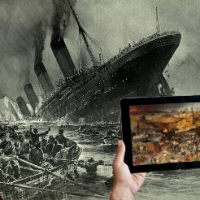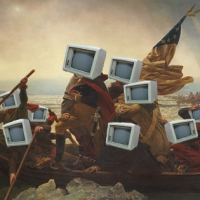A Virtual Reality or A Virtuous Reality? – Facebook buys Oculus
The future of technology is right in front of your face! No, really, that’s where it’s going to be: in front of your face.
Or, to be slightly more accurate, perhaps it’s going to be resting on your face. Which is to say that the fancy consumer devices of tomorrow may not be the things you look down at, but the things through which you look out at the world. The most obvious example of this is, of course, Google Glass, but now Facebook has joined them as another company committed to putting the machine in your head. Sorry, not quite (not yet anyways), Facebook has joined Google in being committed to putting the machine on your head.
Just a few weeks after buying the drone manufacturer Titan Aerospace for $60 million, which was bought just a few weeks after they snagged WhatsApp for $16 billion, Facebook has now bought Oculus VR for $2 billion (most of which is in stock). Oculus VR is the maker of a virtual reality (hence VR) headset called the Oculus Rift – a device that promises to deliver to its users a rich and immersive experience in a computer created world by giving people a way to opt out of rich and immersive experiences in the world that created computers. While, at present, Oculus seems poised to reshape the video game field, what is clear from Facebook’s message crowing about the acquisition is that this is about much more than video games. Indeed, as with everything that Facebook does, Facebook has to drown everything it does in its saccharine PR reminder that its:
“mission is to make the world more open and connected.”
If you feel like you’ve heard that line before, know that it is because you have. What’s amusing is that this almost exact sentiment was repeated in Oculus’s announcement of the deal, wherein Oculus noted:
“we want to contribute to a more open, connected world; and we both see virtual reality as the next step.”
The repetition of “open” and “connected” is amusing, but what is more significant is the declaration that Facebook has concluded (along with Oculus, hence the “we”) that “virtual reality” is “the next step.” All of this corporate propaganda about a more “open” and “connected” world is enough to make one pine for the days when corporations simply came out and uncaringly declared what they really meant, which in this case would be: “we want to make more money, and we think virtual reality is the next step in getting more money, also we wanted to buy Oculus before somebody else did, also we just changed the privacy settings again, also would you like to meet singles in your area?” While the premonitions of Facebook’s demise are always overblown, the fact remains that Facebook seems to recognize that the company’s future depends on more than just their eponymous social network – hence buying Instagram and WhatsApp, though things take a slightly odder turn when one considers Titan Aerospace and Oculus.
Technology does not exist outside of the society in which it is created, tested, marketed, sold, and into which it is eventually integrated. Thus trying to understand a given piece of technology, or the actions of a given technology firm, outside of the larger societal framework is to be unable to see the technological society for the technological device. So, what happens if we consider Facebook’s purchase of Oculus not as the eccentric purchase of an unpredictable tech billionaire, but in the context of other technological shifts in society? The answer is that one immediately needs to think about the other (previously mentioned) spectacular piece of tech spectacles: Google Glass.
The Oculus VR headset and Google Glass are two ways of answering the same question, that question: how will technology change the way that we see the world? “See” in this context is meant rather literally, and these devices demonstrate new ways in which technology will allow people to mediate the technological world. In the case of Glass the technology interacts with the user in a slightly more subtle (and for that reason more insidious) way: it does not transport the user into a computer created reality but instead turns everyday reality into something which can constantly be re-created with the assistance of computer intervention.
Whereas Google recently lambasted the “myth” that Glass covers its users eyes (which it actually does if you translate “covers” as “mediates”) – Oculus clearly does cover its user’s eyes, and based on some images of the prototypes the user’s ears as well. Oculus immerses the user in the technology, while Glass immerses the technology in the user. Though it is unlikely that people are going to coin a belittling term for Oculus users on par with the scathingly on point “glasshole” – perhaps “Oculuser” (pronounced “Ocu-loser” [to connote those who wind up spending all of their time plugged into Virtual Reality])?
New tech devices, from Glass to Oculus to Android Wear, are the result of the quandary that the tech industry has quarantined itself within. Their profits are reliant upon these companies’ being able to continually grow and expand, and they are able to do this insofar as their products are never really about the satisfaction of real needs but instead are about manufacturing new needs for which they are then ready to sell people the solution. In Facebook’s announcement of the purchase of Oculus this sense emerges wonderfully by considering two lines spun out in Mark Zuckerberg’s excited techno-utopian prose:
“Oculus’s mission is to enable you to experience the impossible.”
and
“The future is coming and we have a chance to build it together.”
Right away, one should be able to detect (in the second line) the beautifully misleading way in which the words “we” and “together” are aligned. It is tempting to think that this “we” and “together” refer to Facebook and its users, but in the end the “we” is Facebook and Oculus and the “build it together” is being done by Facebook and Oculus. The sense in which everyday users get to “build it” was made quite clear when you consider the debt Oculus owes to the thousands of people who chipped in for its Kickstarter campaign – the way in which the rest of the “we” can contribute is just by giving money, after which no more input is sought.
This disjunction between the “we” and the “together” brings us to the even more troublesome question of the ability (“mission”) of Oculus, which we are told is to let its users “experience the impossible.” Now, it is certainly true that virtual reality and video games allow people to experience things that are impossible (there are no “extra lives” in real life) – but this “impossible” should be thought of as it regards Facebook’s always repeated tagline of an “open and connected world.” All of which makes it darkly hilarious that some of the uses that Facebook fantasizes about for Oculus include attending a sporting event, talking to a doctor, or sitting in a classroom…are these things that are really impossible? Which is not to claim that attending sporting events, talking to a doctor, or sitting in a classroom are things readily available to one and all – but for those unable to talk “face-to-face” with a doctor is what they need an Oculus headset or is what they need a society that thinks the health of its citizens is more important than the bottom lines of tech companies? It would be laughable if Facebook was not so sincerely insincere in its fantasizing.
Facebook’s Oculus (and Google’s Glass) will allow people to experience worlds that were previously “impossible” to experience that much is certainly true. Yet even as these devices promise to transform reality, or transport us to another reality, they reinforce the status quo in which tech firms are never short on funds with which to buy start-ups but in which the infrastructure around us is crumbling (maybe if the former did not stash their profits in tax havens [but I digress]). When a person gets home they may be able to don their Oculus headset and visit a fantastical world, but what of the state of the actual world around them?
Oculus will allow users’ to “experience the impossible” but is our contemporary problem that we cannot enjoy a fantasy of strolling on Mars or that we cannot imagine a way that we will adequately address climate change? Is the challenge that it is impossible to imagine ourselves in a lecture hall without Oculus, or that we cannot imagine how we will ever pay off our student loans? To what extent does dreaming about the “open and connected” world of the “impossible” act as a further way of distracting us from the thinking about the possible – if difficult – ways in which we can work to actually make our world open and connected?
Devices like Oculus and Glass are certainly neat, but the more we look at the world through technology, the more “impossible” it seems to become for us to ask whether or not we really need all of this technology.
Virtual reality is interesting, and it’s probably a lot of fun for those who can afford it, but despite what Facebook says in its press releases – virtual reality is not synonymous with making a virtuous reality.
What may be “impossible” is for the tech industry to realize that.
Related Content
Human Rights and Technological Wrongs
This “Open Future” Has Been Brought to You By…
Luddism for these Ludicrous Times
[Image note: The image of the man wearing Oculus is by Sergey Galyonkin, placed on Wikipedia under a Creative Commons license]












Excellent!
Pingback: Disrupt Everything! (as long as it’s profitable) | LibrarianShipwreck
Pingback: A Charitable Definition of Charity | LibrarianShipwreck